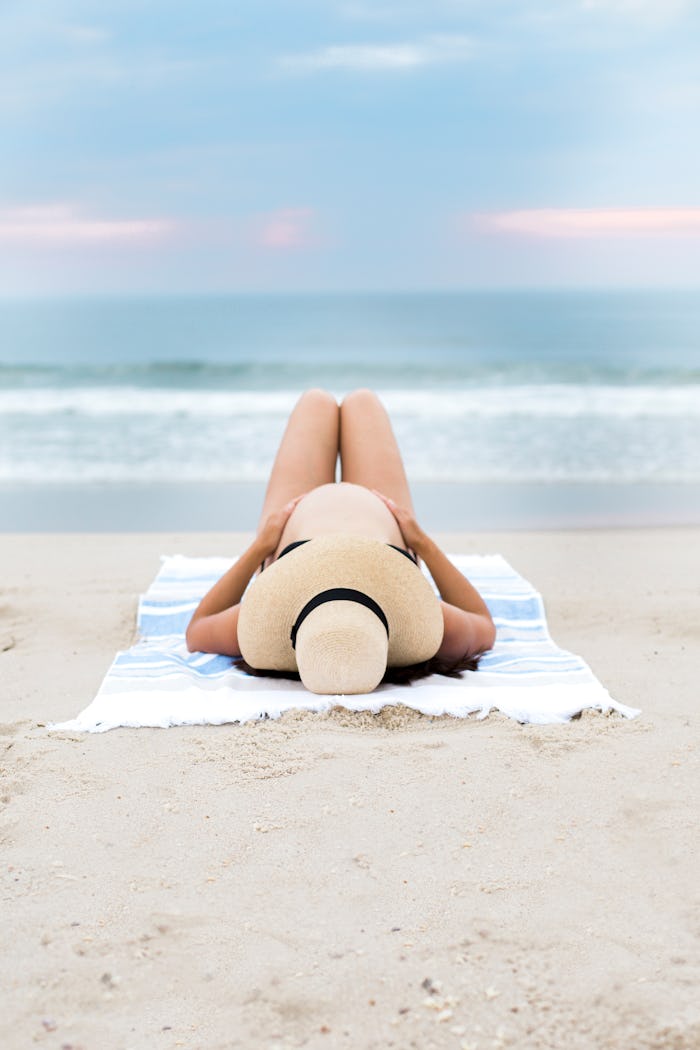Summer Fun

Can You Sunbathe During Pregnancy?
Not really. But here’s what you should know.
No one is looking to suck the fun out of summer. You should relish every minute of the season, responsibly. But lounging around in the sun unprotected is just a big mistake. “Sunbathing is never safe, as it increases the risk of skin cancer,” says Dr. Mona Gohara, M.D., associate clinical professor, Yale School of Medicine, department of dermatology.
“I always recommend that my patients protect themselves from sun exposure as much as possible, whether they are pregnant or not!” says Dr. Dendy Engelman, M.D., board-certified NYC-based cosmetic dermatologist and Moh's surgeon. “Even small amounts of sun damage can add up over time and cause serious issues.”
But if you are pregnant, it’s important to consider that there is a slightly higher risk of burn, says Engelman, “as your hormone levels may make your skin more sensitive and vulnerable to UV damage.” Now, this doesn’t mean you can’t get outside, get active, and get happy. It just means you have to take a few precautions, many of which should be on your summer checklist in every stage of your life.
What’s The Harm In Sunbathing, Anyway?
Ooofff. Let’s just say the activity should never be on your agenda, no matter the season. “The American Academy of Dermatology recommends avoidance of indoor or outdoor tanning,” noting the risk of skin cancer, Dr. Gohara tells Romper. And the UV rays from the sun are not kind to your skin, causing burns, skin cell damage, and prompting visible signs of aging over time, details of which are shared by the U.S. Food & Drug Administration (FDA).
How Safe is Sunbathing While I’m Pregnant?
See above. Then consider this: “Pregnancy can cause your body temperature to rise and your heart to work harder, both of which can make you more prone to overheating,” Engelman tells Romper. “Overheating can have side effects ranging from mild to serious,” she adds, sharing that over 103 degrees Fahrenheit puts your body in the zone. “A fast pulse, headache, nausea, confusion, and lethargy are all signs that your body may be overheating. In more serious situations, it may even cause vomiting and contractions.” Increased temperatures, notes Gohara, can lead to more sweat, which can give you irritating rashes or facial flushing.
And when it comes to your skin, pregnancy does tend to make it more sensitive, says Engelman. “This is because changing hormone levels alter the way the skin reacts to stimuli like sunlight, temperature changes and topical ingredients.” So maybe don’t be too surprised if you think your skin is more sensitive to those rays, says Engelman, or that it now seems dry or irritated. It may no longer deal well with topical products you used to use all the time, she suggests. “Pre-existing skin conditions like eczema may worsen, as well.”
Pregnancy, Engelman shares with Romper, can also cause some skin conditions including melasma, which may appear “as darkening or discoloration on the face due to sun exposure.” Sunscreen can help in the prevention and protection departments, and Engelman notes there are over-the-counter treatments that can help, like glycolic acid. Talk to your dermatologist about the condition, and how pregnancy might have an impact.
But a person’s skin sensitivities while pregnant all depend on the person, says Gohara. “Some may feel more skin reactivity, others may enjoy a seamless time without any skin issue.” But laying out in the sun without protection? That’s going to cause some issues.
Tips To Keep Yourself Safe Under The Sun
A great, effective sunscreen is non-negotiable. “If in direct sunlight, be diligent about applying — and re-applying — mineral sunscreen every two hours, or after excessive sweating or swimming,” says Engelman. A mineral formulation with broad-spectrum protection of SPF 30 or higher is a good bet, suggests Gohara, as is a broad-rimmed hat. Consider clothes with built-in SPF protection. To ward off overheating, “avoid being in the sun for long periods of time, stay hydrated, do not overexert yourself, and seek medical attention immediately if you start to feel hot and experience any adverse symptoms,” Engelman says.
See? Summertime can still be all fun and games — with moderation, and the right sunscreen.
Experts:
Dr. Dendy Engelman, M.D., FACMS, FAAD, board certified cosmetic dermatologist, Moh’s surgeon, Shafer Clinic, NYC
Dr. Mona Gohara, M.D., associate clinical professor, Yale School of Medicine, department of dermatology